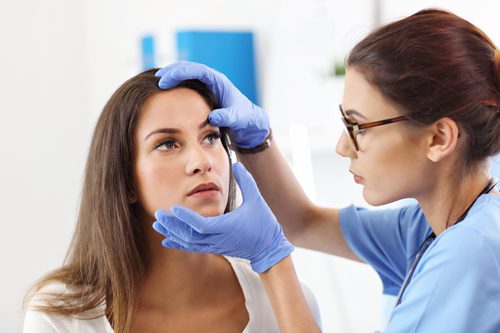Many people are aware that alcohol addiction has a damaging effect on many parts of the human body, such as the liver, pancreas, and stomach. However, most do not know of the damage that excessive drinking can cause to the eyes, including permanently impaired vision.
Short-Term Eye Damage
Excessive drinking and vision problems generally go together.
- One of the most common effects that alcohol has on the eyes is causing distorted, blurry, or double vision. Usually a temporary effect of intoxication, the vision problems wear off slowly as the person becomes sober. These vision disturbances occur because the alcohol slows down the communication between the eyes and the brain.
- Bloodshot or red eyes are another short-term side effect of consuming too much alcohol. This occurs due to dehydration. Changes in blood pressure cause the blood vessels in the eyes to dilate.
- Excessive drinking causes the eyes to become sensitive to light and can cause sharp eye pain or migraine headaches.
- Excessive alcohol consumption also causes the iris to dilate and constrict much slower than normal. The slower pupil reaction time makes it dangerous for drivers since they do not react to oncoming headlights quickly.
- Increased eye twitching, known as myokymia, often occurs when a person drinks too much.
- Intoxication causes a decreased ability to distinguish between various objects based on their darkness and lightness as the eye’s ability to adjust to brightness and contrast is impeded.
Chronic Eye Damage Caused by Alcohol Addiction
Serious, long-term, life-changing eye damage can result from alcohol addiction, including total loss of vision. Both short-term excessive alcohol use and long-term alcohol abuse can lead to permanent loss of vision caused by damage to the optic nerves. These are the nerves that carry vision from the eyes to the brain. Toxic amblyopia, or optic neuropathy, is a painless loss of vision that occurs when the nutrient and oxygen flow to the optic nerve is reduced by changes in blood pressure caused by drinking. Consuming alcohol also reduces the body’s levels of thiamine and B12, which can result in vision damage.
Although toxic amblyopia may be the worst type of eye damage caused by alcohol addiction, many other conditions can occur as toxins from alcohol build in the blood.
- Studies by The American Optometric Association (AOA) show that excessive long-term alcohol consumption directly contributes to age-related macular degeneration (AMD). Macular degeneration causes the person to see less vibrant colors and makes shapes fuzzier. Over time, as the retina deteriorates, it becomes difficult to recognize people’s faces. Eventually, a person will lose focus on their central field of vision.
- The development of cataracts at an earlier age has also been linked to excessive consumption of alcohol. Studies conducted by the AOA show that cataracts, a cloudy opaque area that forms over the normally clear lens of the eye, generally develop in people over the age of 55. Alcohol addiction and the nutritional deficiencies it causes result in the formation of cataracts much earlier.
- Vitamin deficiencies caused by alcohol addiction often cause decreased vision. When a person drinks heavily, the vitamins the body needs to maintain healthy eyesight cannot be absorbed by the liver. For example, a Vitamin A deficiency caused by alcohol consumption can cause thinning of the cornea, corneal perforation, night blindness, and excessive dryness. Blindness from retinal damage can also occur. A deficiency of Vitamin B1 can also occur, causing the eye muscles to become very weak or paralyzed.
- Prenatal alcohol exposure occurs when the fetus has excessive exposure to alcohol in the womb. When this happens, the baby’s eyesight can be permanently affected. Fetal Alcohol Syndrome is directly associated with many eye problems, including difficulty with eye coordination, underdevelopment of the optic nerve, and eyelids that droop.
There is Help Available
Even though the effects of short-term eye damage go away on their own, it is important to see an eye doctor right away to make sure the alcohol has not begun to cause permanent damage. If you or someone you know is having a problem with alcohol or drugs, there is help available. Call and speak to a professional staff member at Canyon Vista Recovery Center in Mesa, Arizona. They will be able to answer your questions, explain the treatment services that are available, and help you to begin your journey to a healthy, sober life.





